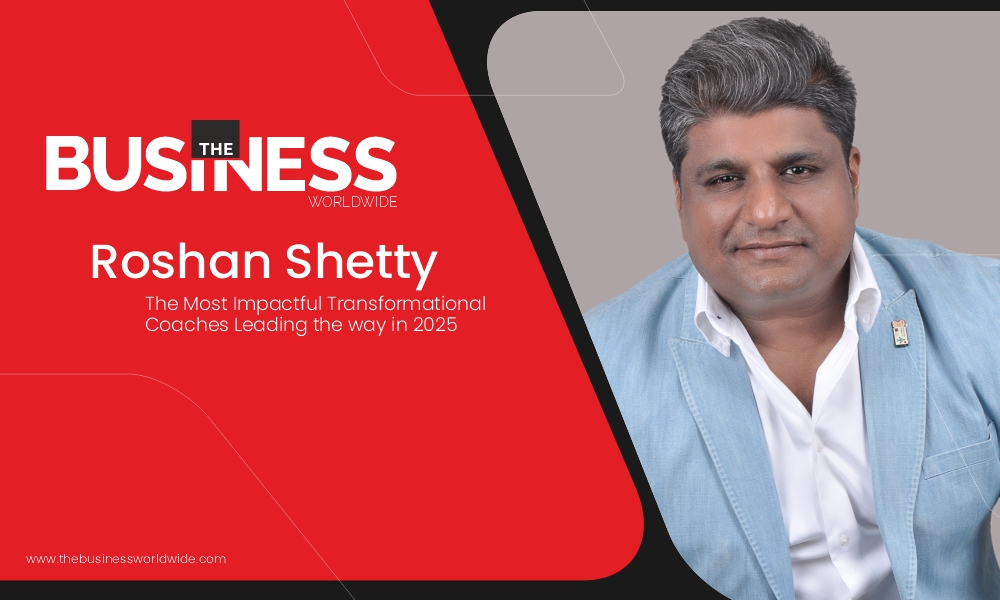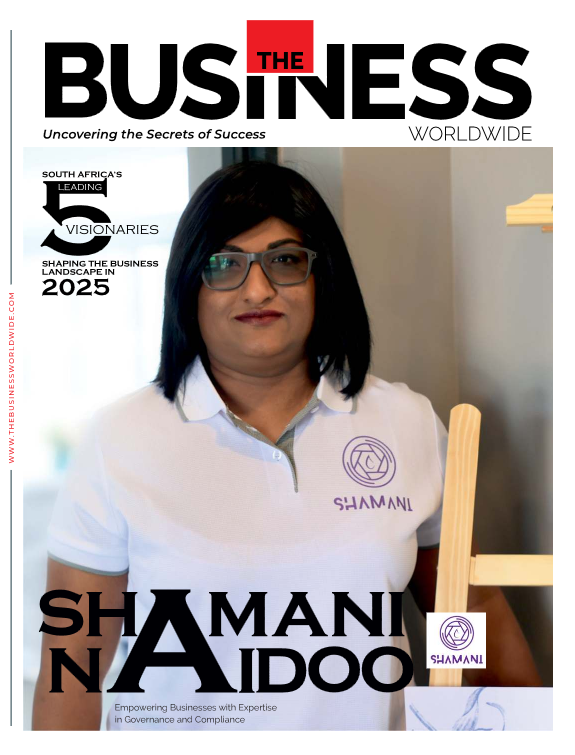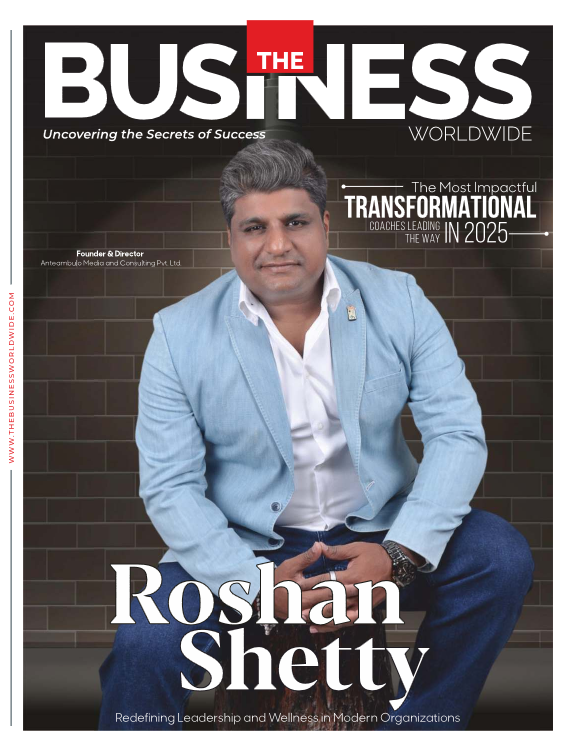Leaders today operate in an environment of constant change and complexity. Most leaders function in a similar trajectory of climbing the corporate ladder, ticking milestones, and pursuing material success. However, for most, there comes a stage when their internal and external motivational factors misalign leading to stagnation of growth and sometimes even a downfall.
Roshan Shetty spent twenty years working for corporations and had a steady growth trajectory. Along the way, he noticed a glaring gap: many high-performing individuals were thriving externally but were unfulfilled internally. He observed this in some of his colleagues, friends and leaders. He saw emotional turbulence, unresolved fears, and stagnation lurking behind their accomplishments. This realization sparked a pivotal question—”What if success could align with emotional well-being?”
The turning point came when he recognized that transformation isn’t about “doing more,” but “becoming more.” It’s about reshaping how people connect with themselves, their teams, and their larger goals. Inspired to help individuals bridge this gap, Roshan delved deep into Emotional Intelligence, Change Management, and personal growth frameworks, laying the foundation for his transformational coaching practice.
As a transformational coach, Roshan provides personalized guidance and support to help leaders navigate the modern challenges effectively. He assists leaders in developing self-awareness, enhancing emotional intelligence, and unlocking their full potential. He offers a fresh perspective, helping leaders identify blind spots and areas for growth. He acts as a catalyst for personal and professional growth, enabling leaders to thrive in an ever-evolving landscape.
Decoding and Navigating Challenges
Roshan loves navigating challenges together with his clients. The most recurring ones he encounters include:
1. Resistance to Change: Whether it’s adopting new habits or shifting perspectives, people struggle with stepping out of their comfort zones. He helps them reframe change as an opportunity rather than a threat.
2. Lack of Emotional Awareness: Many individuals operate on autopilot, unaware of their emotional triggers. Through emotional intelligence exercises, Roshan guides them in identifying patterns and building self-regulation.
3. Overwhelming and Burnout: Clients often juggle too much and lose sight of their purpose. His approach involves redefining priorities, creating healthy boundaries, and fostering self-compassion.
4. Fear of Failure: Fear paralyzes action. Roshan helps clients embrace a “fail-forward” mindset, seeing setbacks as valuable learning opportunities.
“The key lies in equipping clients with frameworks that enable consistent self-reflection, action, and adaptation. Transformation isn’t linear, but by nurturing awareness and accountability, growth becomes inevitable,” says Roshan.
A Customized Approach
Customization lies at the heart of Roshan’s coaching methodology. Each individual or group brings unique aspirations, challenges, and contexts to the table, and a one-size-fits-all approach simply doesn’t work.
For corporates, he focuses on leadership development, change management, and performance optimization. Emotional intelligence becomes the anchor—helping leaders and teams navigate high-pressure environments, drive collaboration, and inspire transformation. Roshan’s programs for corporates range from a day to six months, depending on the training objectives. He often incorporates real-world case studies, role-playing, and reflective exercises to address specific organizational pain points.
For educational institutions, the emphasis shifts to nurturing a growth mindset, resilience, and self-awareness among students. Young minds need tools to manage transitions, uncertainties, and expectations—skills often absent in traditional curriculums.
Individual Coaching Workshops are more personal, and interactive, fostering self-discovery and problem-solving through experiential learning. By understanding his clients’ core needs, Roshan designs programs that combine science-backed insights with practical applications, ensuring the transformation is impactful and lasting. The results reflect in their transition with skills that are crucial for life.
Turning a Writer
Roshan’s foray into writing stemmed from dealing with chronic anxiety for three years. The coping mechanisms led him to journal the process and get into writing. Coaching one individual at a time creates ripples, but a book like “Shift Left” can make waves. Today, as a transformational coach and author, Roshan empowers others to unlock their emotional intelligence, overcome biases, embrace change, and steer transformation in their personal and professional lives.
The motivation for writing his book, “Shift Left” was born from a single insight: most people tackle problems too late in the journey. Whether it’s career crises, failing relationships, or burnout, the root cause often lies in unaddressed emotional and behavioural patterns.
“Shift Left” is Roshan’s attempt to help readers act early—”shifting left” on their personal and professional timelines to anticipate challenges before they escalate. It’s about recalibrating their mindset, habits, and behaviors to take proactive control of their growth journey.
“The key message? True transformation begins by embracing emotional intelligence and self-awareness as tools for lifelong change. Our thoughts aren’t random; they tell us much about our mindset. If readers walk away knowing they can pause, reflect, and choose the correct response—not just react—they’ve already taken a decisive step toward living with intention and purpose,” he shares.
The Crucial Role of Emotional Intelligence
Roshan’s first book was on Emotional Intelligence and it forms the bedrock of every workshop or coaching he delivers. Emotional Intelligence (EI) is the cornerstone of effective leadership and personal growth. Leaders with high EI inspire trust, resolve conflicts empathetically, and drive teams toward shared goals. It isn’t just about “being nice” but about understanding emotions—your own and others’—and using that insight to make better decisions.
In personal development, EI is a game-changer. Self-awareness enables individuals to identify their strengths and blind spots, self-regulation helps manage stress and impulses, and social awareness builds deeper connections. Roshan does this with reflective exercises during the programs. Without emotional intelligence, even the most talented individuals risk plateauing in their growth.
Staying on Top of his Game
Roshan believes that continuous learning and staying updated with the latest trends and research in human psychology, emotional intelligence, and well-being is crucial and non-negotiable in his field. The good part is he loves immersing in the unknown and remains curious. He regularly:
· Reads extensively: Books, academic journals, and thought leadership articles keep me informed about emerging ideas in psychology, emotional intelligence, and human behavior. Annually he consumes close to 40-45 books. But if a book repeats something he has already known, he doesn’t mind dropping it as well.
· Engages in forums and workshops: Participating in global coaching networks and attending conferences helps him stay connected with industry peers and thought leaders. He also tries to learn a lot from insights shared online.
· Learns from clients: Every coaching session offers unique insights into human behavior. Roshan sees his clients as collaborators in learning, and refining his methodologies through their experiences.
Sustainable Positivity
Habit formation is often perceived as tough discipline and it makes everyone run away from it. Habit formation hinges on small, consistent actions. Roshan guides clients using these principles:
1. Start Small: Transformations begin with micro-habits—simple, achievable actions that compound over time. If you want to sort your life, start by sorting your bed each morning, then your wardrobe every week. Get in love with the act of sorting and let it build.
2. Anchor New Habits: By linking new habits to existing routines, clients find it easier to integrate them into daily life. Roshan calls this the art of Habit science and loves how it works in real life. James Clear terms this as “Habit Stacking” in his bestselling book – Atomic Habits.
3. Track Progress: Measuring progress (even in small increments) reinforces motivation. We are driven by dopamine. Positive results make us feel better and push us to repeat the act in anticipation of the reward. Trackers help immensely in building routines.
4. Identify Barriers: Understanding what triggers old behaviors helps clients create strategies to overcome setbacks.
5. Build Accountability: Whether through check-ins, journaling, or support systems, Roshan ensures clients stay committed to their goals.
“Positive habits, when sustained, become a natural part of one’s identity, creating lasting transformation,” he says.
Trends in the Industry
Roshan points out that several trends will define the future of coaching and transformation:
· Integration of Technology: AI-driven coaching platforms will make personalized insights more accessible. Roshan is amazed at what platforms like Khan Academy are doing to uplift the ecosystem by empowering educators rather than eradicating them.
· Focus on Emotional Intelligence: As automation rises, human-centric skills like empathy, resilience, and communication will become indispensable. He firmly believes it is EI that will distinguish us from AI and give us the edge in decision-making and critical thinking.
· Holistic Well-being: Companies will prioritize employee mental health and emotional well-being as core business strategies. Employees are moving higher up on the need hierarchy of Maslow’s model. Many professionals today are content with their basic needs and yearn for self-esteem and self-respect.
· Adaptability in a VUCA World: With volatility and uncertainty becoming constants, individuals and organizations will need frameworks to manage change effectively. You have to upskill every 8-10 years and ensure you thrive and not merely survive with what you have learned to stay relevant.
Goals Ahead
In the next five years, Roshan’s vision is to position his coaching practice as a catalyst for change, impacting thousands of lives globally. He aims to scale his services through:
· Digital Coaching Platforms: Creating accessible tools and resources for individuals and organizations worldwide.
· Collaborative Partnerships: Working with institutions and corporations to embed emotional intelligence and transformation into their core cultures.
· Thought Leadership: Expanding my reach through books, workshops, and keynotes that inspire proactive personal and professional change.
“By staying rooted in my purpose and evolving with the needs of my audience, I aim to create a ripple effect of meaningful transformation,” he says.
For People on a Journey of Self-improvement and Transformation
Roshan concludes our interaction with the following message for seekers:
“Transformation begins with one simple step: Awareness. Before seeking external change, understand who you are, what you value, and where you feel stuck. Self-reflection lays the foundation for growth.
Once aware, focus on action. Start small, but start now. Transformation doesn’t require grand gestures; it requires consistent, intentional effort.
Finally, embrace discomfort. Growth often feels messy and uncertain, but that’s where breakthroughs happen. Surround yourself with mentors, coaches, or communities who can support your journey. Remember, you are the average of the five people you spend most of your time with.”




